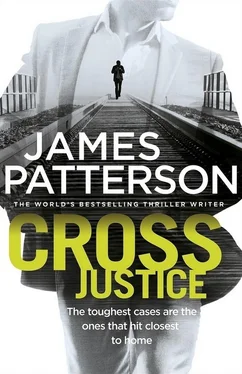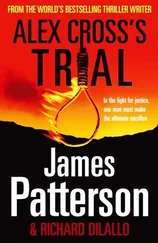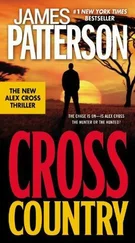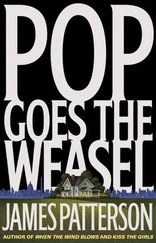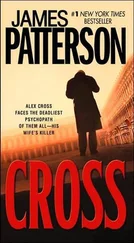“Did you notice neither of you ever uses their names?” Bree said.
“Christina and Jason,” Nana Mama said quietly, and I glanced in the mirror again, saw how sad she was all of a sudden.
“What were they like?” Ali asked, still looking at his iPad.
For the first time in decades, I felt grief and sadness about the loss of my mom and dad. I didn’t say a word.
But my grandmother said, “They were both beautiful, troubled souls, Ali.”
“Train coming, Alex,” Bree said.
I took my eyes off the rearview and saw lights blinking and safety gates lowering. We slowed to a stop two cars and a panel van from the gates and watched the slow-moving freight cars rumble by.
I flashed on images of myself — eight? nine? — running along these same tracks where they passed through woods near our home. It was a rainy night, and I was very scared for some reason. Why was that?
“Look at those guys up on the train!” Ali said, breaking into my thoughts.
There were two people up on one of the boxcars, one African American, one Caucasian, both in their late teens, early twenties. As they went through the crossing, they sat down, legs hanging off the front of the container car, as if settling in for a long trip.
“We used to call men who rode the trains like that hoboes,” Nana Mama said.
“Kind of well dressed for hoboes,” Bree said.
As the car the young men were on rolled through the crossing, I saw what Bree was talking about. They wore baseball hats turned backward, sunglasses, headphones, baggy shorts, black T-shirts, and shiny high-top sneakers. They seemed to recognize someone in the car ahead of us, and each of them gave a wave with three fingers held high. An arm came out the driverside window of that car and returned the salute.
And then they were gone, and the caboose of the train soon after that, heading north. The gates lifted. The lights stopped blinking. We drove on across the tracks. The two cars went right, and I had to slow to let the van take a left at a sign that said CAINE FERTILIZER CO.
“Eeeuw,” Ali said. “What’s that smell?”
I caught it too, said, “Urea.”
“You mean like in pee?” Jannie asked, disgusted.
“Animal pee,” I said. “And probably animal poop too.”
“God, what are we doing here?” she said with a groan.
“Where are we staying?” Ali asked.
“Naomi made the arrangements,” Bree said. “I just pray there’s air-conditioning. It’s gotta be ninety, and if we’re downwind of that smell...”
“It’s eighty,” I said, looking at the dash. “We’re up higher now.”
I drove on by instinct, remembering none of the street names but somehow knowing the way to downtown Starksville as if I’d been there the day before and not three and a half decades ago.
The town center had been laid out in the early 1800s around a rectangular common that now featured a statue of Colonel Francis Stark, a local hero of the Confederacy and the son of the town’s founder and namesake. Starksville should have been a place you’d describe as quaint. Many of the buildings were older, some antebellum, some brick-faced like the factories at the edge of town.
But hard economic times had hit Starksville. For every business open that Thursday — a clothing emporium, a bookstore, a pawnbroker, a gun shop, and two liquor stores — there were two more that stood empty with their front windows soaped over. For Sale signs hung everywhere.
“I can remember when Starksville was not a bad place to live even with the Jim Crow laws,” Nana Mama said wistfully.
“What are Crow laws?” Ali asked, scrunching his nose.
“They were laws against people like us,” she said, and then she pointed a bony finger at a defunct pharmacy and soda fountain called Lords. “Right there, I remember there were signs that said ‘No Coloreds Allowed.’”
“Did Dr. King take those down?” my son asked.
“He was responsible, ultimately,” I said. “But to my knowledge, he never actually came to—”
Jannie cried, “Hey, there’s Scootchie!”
My niece was on the sidewalk in front of the county courthouse arguing with an earnest-looking African American man in a well-cut gray suit. Naomi wore a navy blue skirt and blazer and clutched a brown legal-size accordion file to her chest, and she was shaking her head firmly.
I pulled over and parked, said, “She looks busy. Why doesn’t everyone wait here? I’ll get directions to where we’re staying.”
I climbed out into what was, by Washington, DC, standards, a banner summer day. The humidity was surprisingly low and there was a breeze blowing that carried with it the sound of my niece’s voice.
“Matt, are you going to fight every one of my motions?” Naomi demanded.
“Course I am,” he said. “It’s my job, remember?”
“Your job should be to find the truth,” she shot back.
“I think we all know the truth,” he replied, and then he looked over her shoulder at me.
“Naomi?” I called.
She turned and saw me, and her posture relaxed. “Alex!”
Grinning, she trotted over, threw her arms around me, and said quietly, “Thank God you’re here. This town is enough to drive me mad.”
“I came as soon as I could,” I said. “Where’s Stefan?”
“Still in jail,” she said. “Judge’s refusing to set any kind of bail.”
Matt was studying us — or, rather, me — intently.
“Is your friend the DA?” I asked quietly.
“Let me introduce you,” she said, “rattle his chain.”
“Rattle away,” I said.
Naomi walked me over to him, said, “Assistant district attorney Matthew Brady, this is my uncle and Stefan’s cousin Dr. Alex Cross, formerly of the FBI’s Behavioral Science Unit and currently a special investigator with the Washington, DC, Metro Police.”
If Brady was impressed, he didn’t show it, and he shook my hand with little enthusiasm. “You’re here why, exactly?”
“My family and I have been through a rough time lately, so we’re on a little R and R to visit my roots and provide my cousin with some moral support,” I said.
“Well.” He sniffed and looked at Naomi. “I think you should be thinking plea bargain if you want to give Mr. Tate moral support.”
Naomi smiled. “You can stick that idea where the sun don’t shine.”
Brady grinned pleasantly and held up his hands, palms out. “Your call, but the way I see it, Naomi, you plead, and your client lives a life behind bars. You go to trial, and he most certainly gets the death penalty.”
“Good-bye,” she said sweetly as she took my arm. “We’ve got to be going.”
“Nice meeting you,” I said.
“Likewise, Dr. Cross,” he said and walked away.
“Kind of a cold fish,” I said when he was out of earshot and we were heading back to my car.
“He’s gotten that way since law school,” she said.
“So you’ve got history?”
“Just old classmates,” Naomi said, then broke into a squeal of delight when Jannie opened the Explorer’s door and climbed out.
In a few moments everyone was out on the sidewalk hugging Naomi, who couldn’t get over how tall and strong Jannie had become and got tears in her eyes when my grandmother kissed her.
“You don’t age, Nana,” Naomi said in wonder. “Is there a painting in an attic somewhere that shows your real age?”
“The Picture of Regina Cross.” Nana Mama chortled.
“It’s just so good to see you all,” Naomi said, and then her face fell slightly. “I just wish it were under different circumstances.”
My wife said, “We’ll figure out the real story, get Stefan released, and have a nice vacation.”
Читать дальше
